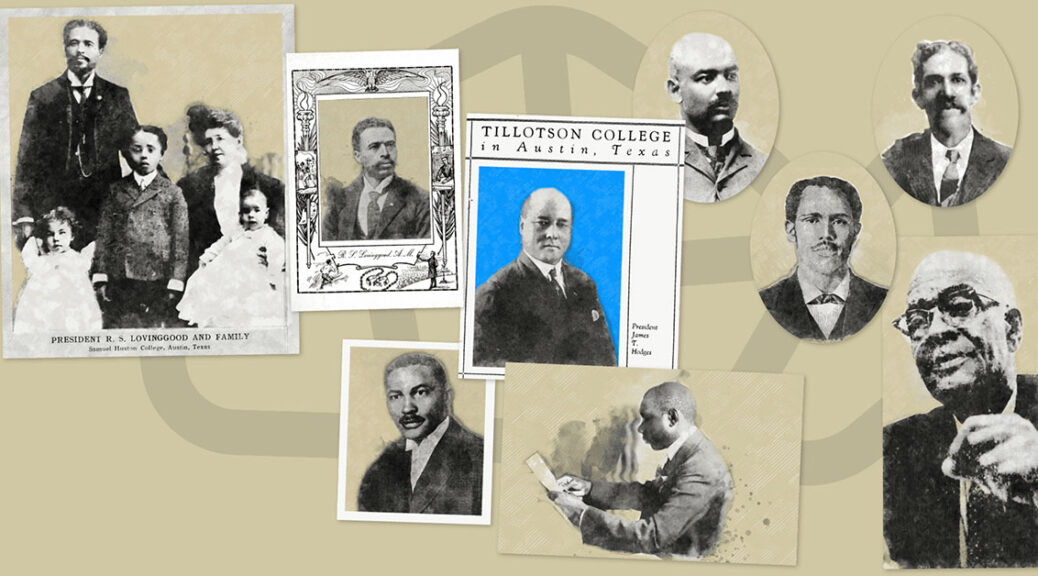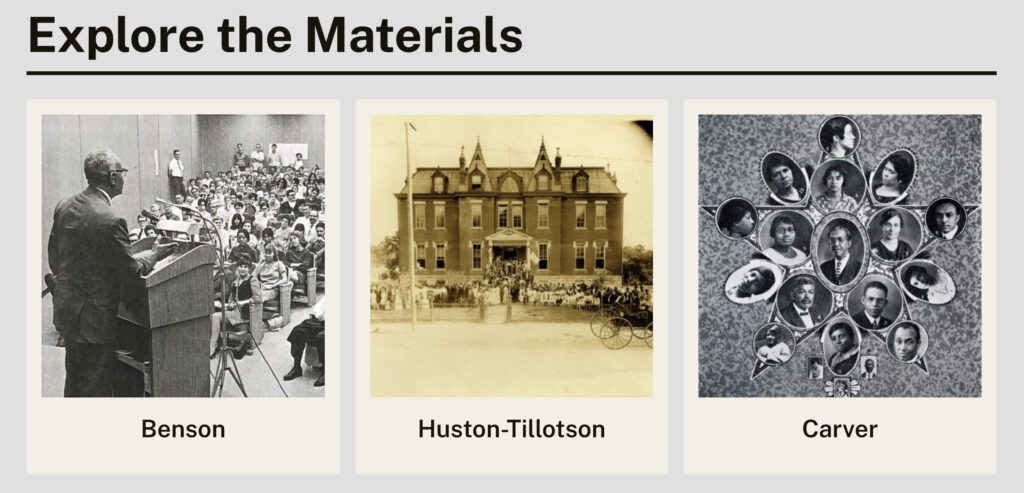Read, hot & digitized: Librarians and the digital scholarship they love — In this new series, librarians from UTL’s Arts, Humanities and Global Studies Engagement Team briefly present, explore and critique existing examples of digital scholarship. Our hope is that these monthly reviews will inspire critical reflection of and future creative contributions to the growing fields of digital scholarship.
For the past two years, I have been delighted to work on the Black Classicists in Texas exhibition project, a collaborative endeavor to tell the story of Central Texas’ early Black educators and their passion for the study of antiquity. This joint initiative, led by Dr. Pramit Chaudhuri, Dr. Ayelet Haimson Lushkov and myself, involves collaboration between the University of Texas at Austin’s Department of Classics, University of Texas Libraries, the Benson Latin American Collection, Huston-Tillotson University and the Carver Museum & Cultural Center. At its core, the project’s exhibitions underscore advocacy for classics, 20th century African American advancement and highlight a vibrant community of scholars, students and public intellectuals.
Although the physical exhibitions concluded in December 2023, their legacy endures through an online exhibition that emphasizes the relationship between education about the classics, historically Black colleges and universities (HBCUs) and the historical trajectory of education in Austin. Leveraging digital platforms, the online exhibition employs multimodal approaches including story maps, virtual tours and digitized archival materials to provide users with a dynamic exploration of the individuals and institutions intertwined in this narrative.
The website, a cornerstone of the project, exemplifies the initiative’s collaborative efforts. Choosing the education-friendly Reclaim Hosting allowed for easy hosting, a custom domain and installation of web applications with the built-in installer, Installatron. Through Installatron, we were able to build a custom website with WordPress, assisted by the exceptional team at UT Austin’s Liberal Arts Instructional Technology Services and beautifully designed by the creative studio, In-House International.
The “Explore the Materials” section of the website provides users with access to digitized versions of the physical exhibition materials, alleviating the need for researchers to physically visit archives to view the items. As someone intimately involved in the project’s archival research process, I am delighted to offer researchers an easy access point to these materials, each complete with detailed metadata and sourcing information, ensuring folks can find the original materials even now after the physical exhibition is over.
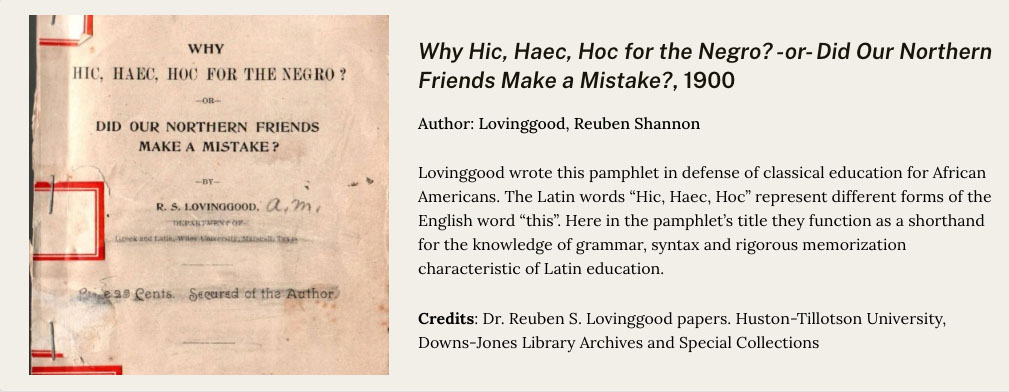
Archival research often presents challenges, whether the archival finding aid is detailed, vague or non-existent. That’s why it’s particularly exciting to preserve items that might not be found through traditional methods. These include a photograph of Samuel Huston College President Matthew Simpson Davage, discovered in a box of unprocessed photographs brought to the research team by the former Huston-Tillotson University Archivist. Similarly, hard to track down documents like the 1976 report of UT’s affirmative action compliance from the Black Diaspora Archive and custom exhibition panels and maps are now digitally accessible.
Beyond digitized materials, the website features technologically innovative elements, including 3D models of the physical exhibition spaces courtesy of our collaborators at In-House. Hosted on the freemium 3D platform, SketchFab, these interactive models preserve the essence of the physical exhibitions, offering users an immersive experience. They even allow users to see some of the materials in greater detail than possible in-person.
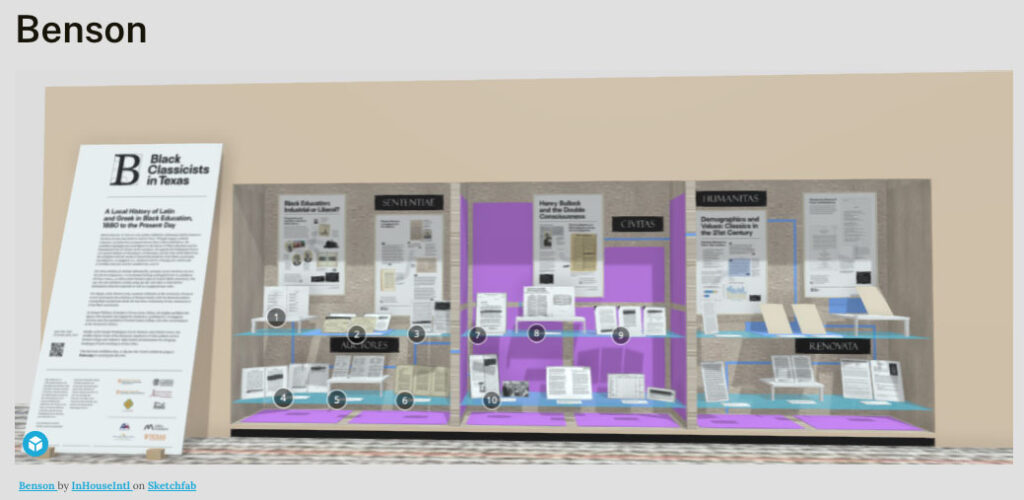
Additionally, the ArcGIS StoryMap linked on the site, “This is My Native Land: Tracking the “Classical” Legacy Across Texan Historically Black Colleges and Universities”, adds another interactive element to the story of Black Classicists in Texas and their legacy. While many of the tools we used in the project came at a cost, we were fortunate to create an ArcGIS Story Map for free.
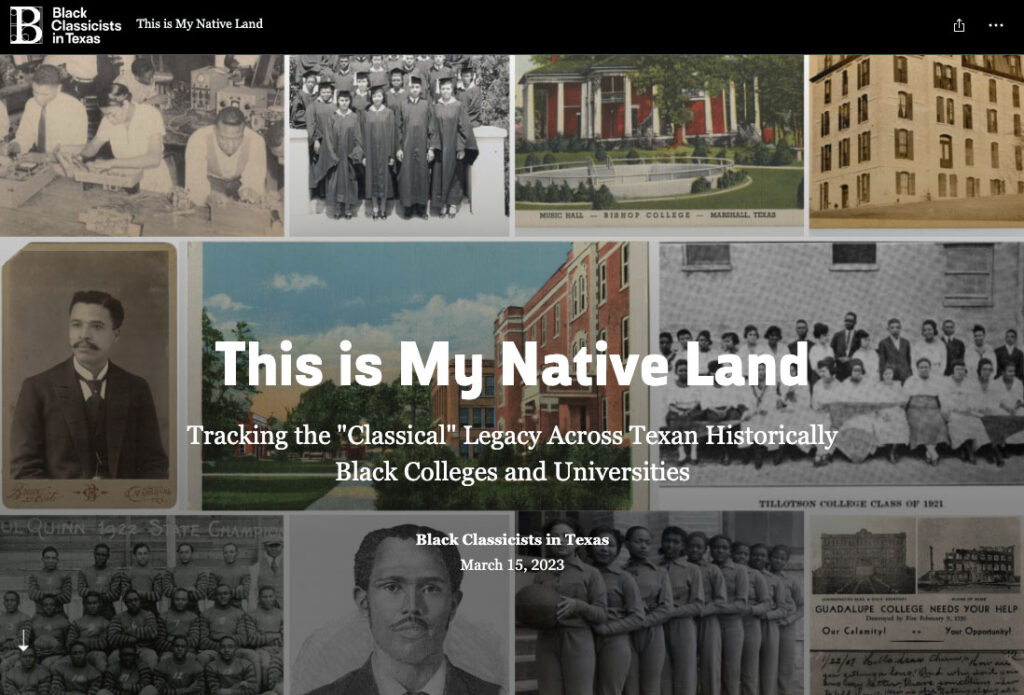
Moreover, pages dedicated to resources on Black history and culture in Austin, alongside preserved interviews originally showcased at the Carver Museum, provide invaluable context and insight into the broader socio-cultural landscape surrounding the Black Classicists in Texas narrative.
By showcasing the contributions of Black Classicists in Texas, the website and associated tools shed light on underrepresented voices in the study of antiquity and Texas educational history. They serve as a testament to the diversity and resilience of these scholars, enriching our understanding of their invaluable contributions and histories.
Explore more in these UT Libraries resources:
Cook, William W., and James Tatum. African American Writers and Classical Tradition. University of Chicago Press, 2010.
Greenwood, Emily. Afro-Greeks Dialogues Between Anglophone Caribbean Literature and Classics in the Twentieth Century. Oxford University Press, 2010.
Hairston, Eric Ashley. The Ebony Column Classics, Civilization, and the African American Reclamation of the West. University of Tennessee Press, 2013.
Cásarez, Adriana. “Diverse Adaptations of Classical Literature.” University of Texas Libraries Exhibits, 2020. https://exhibits.lib.utexas.edu/spotlight/diversity-classics.

